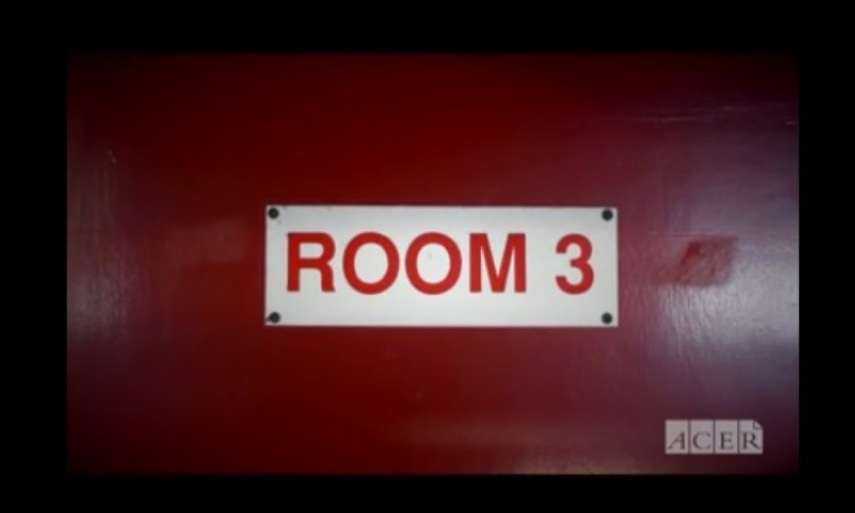Once a fortnight the Teacher team ventures down to Room 3 – the basement archives at the Australian Council for Educational Research.
Home to a plethora of texts originating from way back when, we bring you choice titbits from some of our favourite historical titles via Facebook and Twitter.
Do you have an old education textbook you still refer to? Tweet or Facebook us your favourite quote with the author and year.
If you happened to have missed some of our Room 3 gems, here's a recap of what's recently been posted online (you can also click on the links at the top of this article to explore Volume 1 and 2):
Morse, A.D (1960). Schools of Tomorrow –Today! New York: Doubleday & Company.
‘The gifted teacher can improve her status in one way – by taking an administrative position which will shatter the relationship which established her superiority – her contact with students.' (1960)
‘Free from the artificial limits of grade requirements they push on beyond these arbitrary boundaries. In the process they meet the toughest competitive challenge in the world – the challenge to achieve their highest capacity.' (1960)
‘The overall average: 26 per cent of a teacher's time (not counting nearly 12 hours a week of overtime work outside the classroom) was devoted to nonteaching chores.' (1960)
‘Debates about the shortage in quantity and quality have overlooked the untapped reservoirs of teaching talent.' (1960)
‘The future would be bleak if the richest nation on earth [the US] were unable to recruit and support gifted young people in its most vital profession.' (1960)
‘I know if it weren't for the team setup I'd have that sense of loneliness that every inexperienced teacher has behind the closed doors of her classroom.' (1960)
‘Salaries are not only too low – they also do not offer any range. They seem to operate on the assumption that all teachers are the same and all teaching jobs alike.' (1960)
Adams, J (1930). The Teacher's Many Parts. University of London Press Ltd.
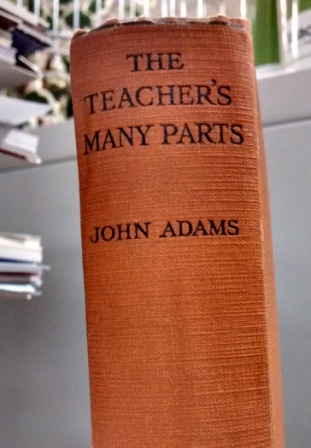
‘It is said that out of school the teacher has to take his place in real life: as if there were something unreal about school life.' (1930).
‘Teachers, above all others, should clearly realise the value of forgotten knowledge.' (1930).
‘All we teachers differ from one another according to the backgrounds our reading has supplied us.' (1930).
‘…One of the most difficult things for a clever teacher is to let his clever pupils be clever in their own way.' (1930).
‘Reading leaves its effects long after the facts acquired have dropped clean out of our memory.' (1930).
Gabriel, J. (1957). An analysis of the emotional problems of the teacher in the classroom. Sydney: Halstead Press.
‘The quality of the education which a child receives at school, though partly dependent upon the type of building, the extent and variety of equipment, is to a greater degree influenced by the personal qualities of the teacher.' (1957).
‘The teacher, to some extent, moulds the shape of things to come.' (1957).
‘Teaching has its roots in human relationships, and human relationships can be formal or informal.' (1957).
‘Children's vitality, enthusiasms and excitements can be nervously exhausting.' (1957).
‘A teacher needs to be genuinely conscientious and interested in the progress and welfare of his pupils. But he also needs himself to develop as a person, to have his leisure-time pursuits and to widen his interests beyond the narrow confines of the school.' (1957).
Corey, F.L. (1955). Values of future teachers: a study of attitudes towards comptemporary issues. New York: Columbia University.
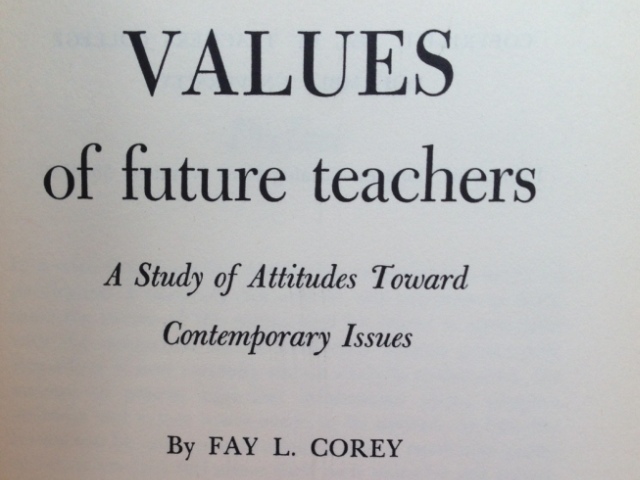
'All around us is evidence of the need to make emphasis on the moral and spiritual values an intimate part of the school program, yet we still do little more than verbalize this need.' (Corey, 1955)
'How do we know what young people believe in, other than through some study reported by a popular magazine?' (Corey, 1955)
'Our greatest responsibility as educators should be to define clearly, and to foster, the values which uphold the great principles of human brotherhood and belief in the worth of the individual that have been uppermost in the minds of great men throughout history.' (Corey, 1955)
'We need to arouse in our young people concern for what they are becoming, not just for what they are accumulating.' (Corey, 1955)
'We know that our beliefs and what has value for us will determine, however subtly, much of the content of our teaching… and our approach to working with students.' (Corey, 1955)
Russell, B. (1926). On Education: Especially in Early Childhood. London: George Allen & Unwin.
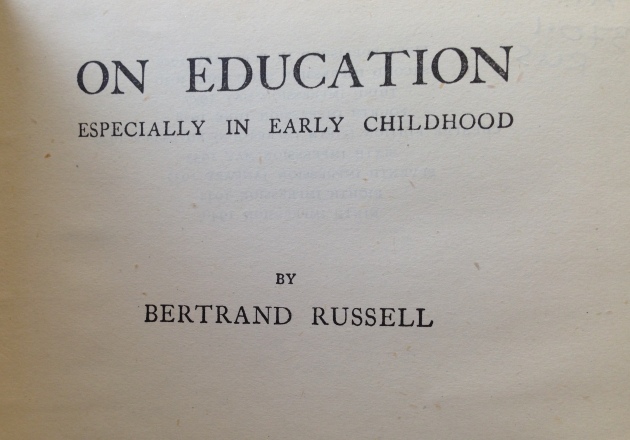
‘The education we desire for our children must depend upon our ideals of human character, and our hopes as to the part they are to play in the community.' (Russell, 1926).
‘Before considering how to educate, it is well to be clear as to the sort of result which we wish to achieve.' (Russell, 1926).
‘Knowledge wielded by love is what the educator needs, and what his pupils should acquire.' (Russell, 1926).
‘Happiness in childhood is absolutely necessary to the production of the best type of human being.' (Russell, 1926).
‘Open-mindedness should therefore be one of the qualities that education aims at producing.' (Russell, 1926).
Howard, B.A. (1928). The Mixed School: A study of coeducation. London: University of London Press.
‘For a school is more than a place of intellectual instruction; it is more, even, than an agency for moral instruction; it is a training-ground for citizenship.' (Howard, 1928).
‘For outside the classroom activities … are undertaken in an atmosphere of real freedom; and they contribute largely to the development of initiative, resource the spirit of sportsmanship and comradeship…' (Howard, 1928).
‘No one can reap the richest fruits of teaching without a wide outlook upon life.' (Howard, 1928).
Melvin, A. (1944). Teaching, a basic text in education. New York: The John Day Co.
‘The art of making pauses is, itself, one which a teacher may be slow to acquire.' (Melvin, 1944)
‘Too many teachers, when giving instruction, talk on ceaselessly, as if afraid to make a pause.' (Melvin, 1944)
‘Many students kill their own learning by an attitude of supposed superiority which is false to the position in which they find themselves.' (Melvin, 1944)
‘Knowing curriculum is like knowing your cards when you play a game. If you know your cards you play each one at the right moment as the game progresses.' (Melvin, 1944)
‘Every teacher must get along with other teachers, teachers with whom he can never see quite eye to eye.' (Melvin, 1944)
‘A teacher should not be a teacher unless he is striving along with others for a better world.' (Melvin, 1944)
‘The real employer of the teacher is the community in which he teaches. The superintendent who does the employing is merely a representative of that community.' (Melvin, 1944)
‘The teacher who knows how to ring the change in his approach to his pupils, keeps them ever awake and active.' (Melvin, 1944)
Lindberg, L. (1954) The Democratic Classroom, New York: Bureau of Publications, Teachers College, Columbia University.
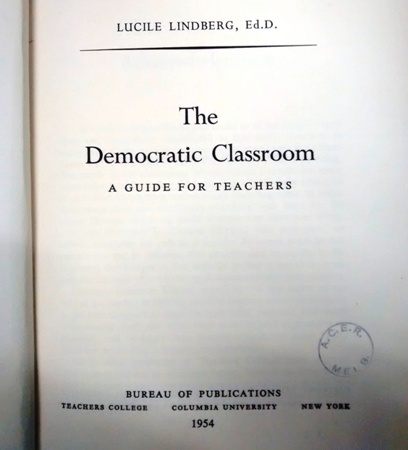
‘Teachers … are seeking ways to develop creative thinking and social skills' (Lindberg, 1954)
‘One task of the teacher is to guide children in learning intelligent ways of identifying needs.' (Lindberg, 1954)
‘The teacher's responsibility is to help children to examine their problems and use group process to seek solutions for them.' (Lindberg, 1954)
On enriching the classroom environment: ‘A teacher working alone cannot possible provide the variety which children and teacher working together can provide.' (Lindberg, 1954)
‘Cooperative planning makes possible a high quality of thinking. Every idea presented sets off a chain of other ideas for each group member.' (Lindberg, 1954)
‘In many classrooms the democratic process is considered simply a set of procedures rather than an on-going way of working together.' (Lindberg, 1954)
‘The teacher works toward enriching the classroom environment as a means of helping the children to deepen already existing interests and to develop new interests through a creative use of school facilities.' (Lindberg, 1954)
‘A teacher may know some things about children's abilities that no child will know, but he cannot know everything about each child that some among thirty children might know.' (Lindberg, 1954)
Mackenzie, G.N., Corey, S.M., and associates. (1954) Instructional Leadership. New York: Bureau of Publications, Teachers College, Columbia University.
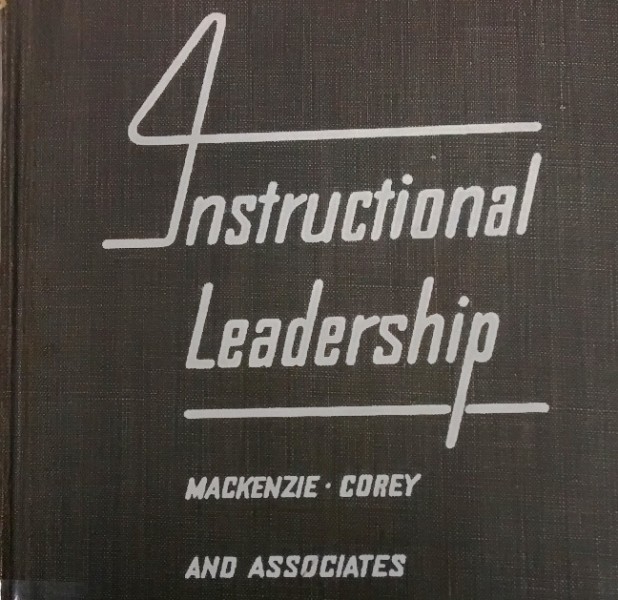
'Good communication is essential to instructional leadership involving the development of mutually desirable goals and means.' (Mackenzie, Corey and associates, 1954)
'When staff members participate actively in making decisions, communication is, of course, greatly facilitated.' (Mackenzie, Corey and associates, 1954)
'Effective communication is a two-way process, but it is often difficult for teachers to communicate their ideas and reactions to official leaders.' (Mackenzie, Corey and associates, 1954)
'... unless clear channels of communication are developed, teachers' attitudes toward and ideas about many problems may never get through to official leaders.' (Mackenzie, Corey and associates, 1954)
Reaney, M.J. (1927). The place of play in education. Methuen & Co. Ltd: London.
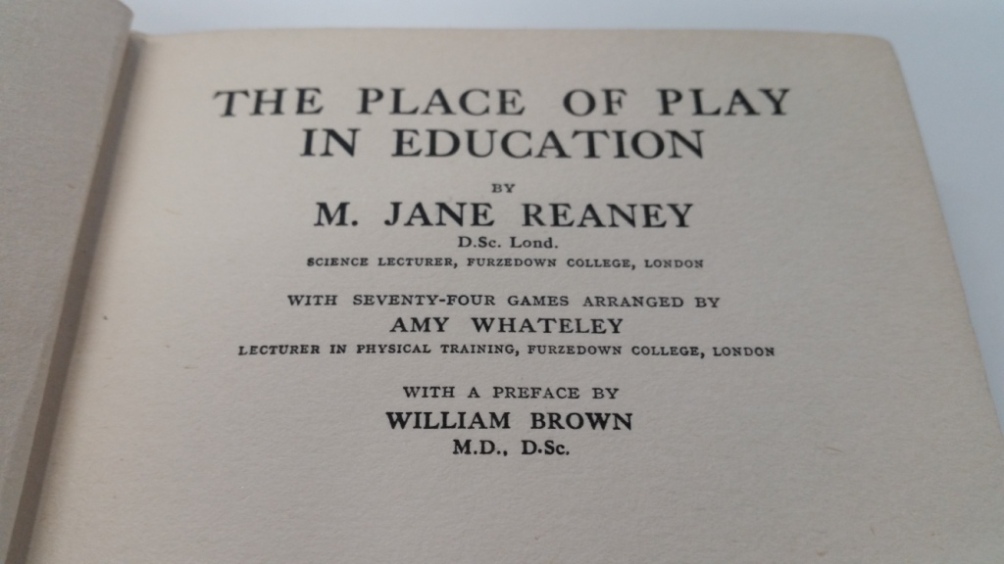
'The work of the teacher in future will [be] to carefully select the material in such a way that it can be presented at the right stage at which it appeals.' (Reaney, 1927)
'In the school of the future, when each child is intensely active with constructive activity, when work is [self expression] ... learning will be a joy because it is done at the right stage.' (Reaney, 1927)
